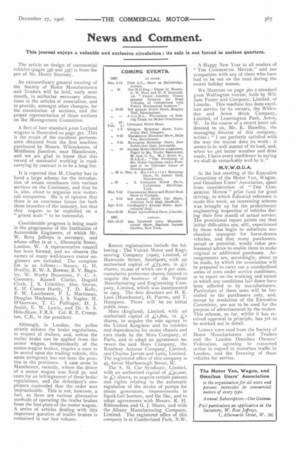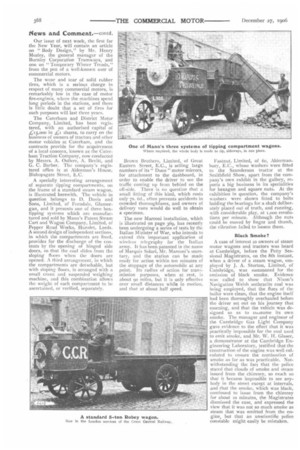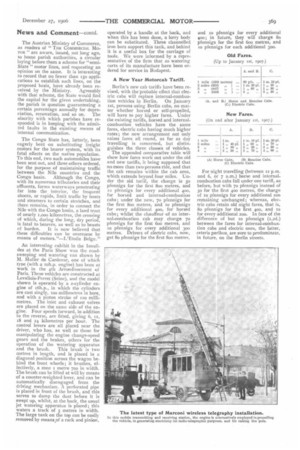News and Comment.
Page 13

Page 16

Page 17

If you've noticed an error in this article please click here to report it so we can fix it.
This journal enjoys a valuable and exclusive circulation ; its sale is not forced in useless quarters.
The article on design of commercial vehicles (pages 356 and 357) is from the pen of Mr. Henry Sturtney.
An extraordinary general meeting of the Society of Motor Manufacturers and Traders will be held, early next month, to authorise necessary alterations in the articles of association, and to provide, amongst other changes, for the constitution of sections, and the proper representation of those sections on the Management Committee.
A fleet of four standard 5-ton Leyland wagons is illustrated on page 372. This is the result of the excellent performance obtained from the first machine purchased by Messrs. Wilcocksons, of Middleton Junction, near Manchester, and we are glad to know that this record of successful working in roadcarrying by contract is to be a long list.
It is reported that M. Charley has in hand a large scheme for the introduction of steam omnibuses into variouS services on the Continent, and that he Is, also, about to organise new motorcab companies. He is of opinion that there is an enormous future for both these branches of the industry, but that they require to be exploited on a " grand scale " to be successful.
Considerable progress is being made in the programme of the Institution of Automobile Engineers, of which Mr. W. Rees Jeffreys is secretary, and whose office is at r, Albemarle Street, London, W. A representative council has been formed, and we observe the names of many well-known motor engineers are included. The complete list is as follows :—Messrs. G. H. Braillie, R. W. A. Brewer, E. V. Baguley, W. Worby Beaumont, F. C. A. Coventry, Russell Clarke, Dugald Clerk, J. S. Critchley„klec. Govan, E. IL Cozens Hardy, T. D. Kelly, F. W. Lanchester, F. L. Martineau, Douglas Mackenzie, J. S. Napier, M. O'Gorman, T. C. Pullinger, D. J. Smith, E. W. Lewis, and Dr. S. S. Hele-Shaw, F.R.S. Col. R. E. Crompton, C.B., is the president.
Although, in London, the police strictly enforce the brake regulations, in respect of trailers, and, unless the trailer brake can be applied from the motor wagon, independently of the motor-wagon brakes, require a man to be seated upon the trailing vehicle, this same stringency has not been the practice in the provinces. A case arose in Manchester, recently, where the driver of a motor wagon was fined 5s. and costs for an infringement of these brake regulations, and the defendant's employers contended that the order was impracticable. This is not, however, a fact, as there are various alternative methods of operating the trailer brakes from the foot-plate of the motor wagon. A series of articles dealing with this important question of trailer brakes is contained in our last volume. Recent registrations include the following : The Vulcan Motor and Engineering Company (1906), Limited, of Haweside Street, Southport, with an authorised capital of ,4;75,000, in 41 shares, 20,000 of which are 6 per cent. cumulative preference shares, formed to acquire the business of the Vulcan Manufacturing and Engineering Company, Limited, which was incorporated in 1903. The first directors are H. E. Lees (Manchester), D. Purves, and T. liampson. There will be no initial public issue.
Mors (England), Limited, with an authorised capital of x:;1,800, in ;CI shares, to acquire the sole agency in the United Kingdom and its colonies and dependencies for motor chassis and cars made by the Mors Company, of Paris, and to adopt an agreement between the said Mors Company, the Roadway Autocar Company, Limited, and Charles Jarrott and Letts, Limited. The registered office of this company is 45, Great Marlborough Street, W.
The S. M. Car Syndicate, Limited, with an authorised capital of „.30,000, in „4'r shares, to acquire certain patents and rights relating to the automatic regulation of the stroke of pumps for steam generators, improvements in burners, and the like, and to adopt agreements with Messrs. R. H. Edmondson and G. J. Shave, and with the Albany Manufacturing Company, Limited. The registered office of this company is at Cumberland Park, N.W.
A Happy New Year to all readers of " THE COMMk:RCIAL MOTOR," and Our sympathies with any of them who have had to be out on the road during the recent holiday season.
We illustrate on page 360 a standard 5-ton Wellington tractor, built by William Foster and Company, Limited, of Lincoln. This machine has done excellent service for its owners, the Willesden and Acton Brick Company, Limited, of Leamington Park, Acton, W. In the course of a recent letter addressed to us, Mr. E. Handley, the managing director of this company, writes : " I am perfectly satisfied with the way the tractor does its work : it seems to be well master of its load, and, when we get better weather and drier roads, I have every confidence in saying we shall do remarkably well by it."
M.V.W•O.U.A•
At the last meeting of the Executive Committee of the Motor Van, Wagon, and Omnibus Users' Association, apart from consideration of "THE ComMERCIAL MOTOR " prize fund for good driving, to which Editorial reference is made this week, an interesting scheme was brought up for the probationary engineering inspection of vehicles during their first month of actual service. The provisional report points out that initial difficulties are, still, experienced by those who begin to substitute mechanical transport for horse-drawn vehicles, and that many purchasers, actual or potential, would value professional advice to enable them to make original or additional purchases. Arrangements are, accordingly, about to be made, by which the association will be prepared to carry out a standardised series of tests under service conditions, or to report on the working and extent to which any conditions laid down have been adhered to by maaufacturers. Particulars of these tests will be furnished to the purchasers only, and, except by resolution of the Executive Committee, are not to be used for the purpose of advertisement by the maker. This scheme, so far, whilst it has received approval in principle, has yet to be worked out in detail.
Letters were read from the Society of Motor Manufacturers and Traders and the London Omnibus Owners' Federation, agreeing to concerted action in regard to motorbus traffic in London, and the licensing of these. vehicles for service. Our issue of next week, the first for the New Year, will contain an article on "Body Design," by Mr_ Henry Moeley, the general manager of the Burnley Corporation Tramways, and one on "Temporary Winter Treads," from the pen of a well-known user of commercial motors.
The wear and tear of solid rubber tires, which is a serious charge in respect of many commercial motors, is remarkably low in the case of motor fire-engines, where the machines spend long periods in the stations, and there is little doubt that a set of tires for such purposes will last three years.
The Caterham and District Motor Company, Limited, has been registered, with an authorised capital of £15,000 in Li shares, to carry on the business of owners of tractors and other motor vehicles at Caterham, and the contracts provide for the acquirement of a local concern, known as the Caterham Traction Company, now conducted by Messrs. A. Ostlere, A. I3evitt, and G. C. Barber. The company's registered office is at Alderman's House, Bishopsgate Street, E.C.
A specially interesting arrangement of separate tipping compartments, on the frame of a standard steam wagon, is illustrated herewith. The vehicle in question belongs to D. Davis and Sons, Limited, of Ferndale, Glamorgan, and it presents one of three boxtipping systems which are manufactured and sold by Mann's Patent Steam Cart and Wagon Company, Limited, of Pepper Road Works, Hunslet, Leeds. A second design of independent sections, in which the compartments are fixed, provides for the discharge of the contents by the opening of hinged side doors, so that the coal slides from the sloping floors when the doors are opened. A third arrangement, in which the compartments are detachable, but with sloping floors, is arranged with a small crane and suspended weighing machine, and this combination allows the weight of each compartment to be ascertained, or verified, separately. Brown Brothers, Limited, of Great Eastern Street, E.C., is selling large numbers of its" Duco " motor mirrors, for attachment to the dashboard, in order to enable the driver to see the traffic coming up from behind on the off-side. There is no question that a small fitting of this kind, which costs only 7s. 6d., often prevents accidents in crowded thoroughfares, and owners of delivery vans would do well to obtain a specimen.
The new Marconi installation, which is illustrated on page 369, has recently been undergoing a series of tests by the Italian Minister of War, who intends to extend this important application of wireless telegraphy for the Italian army, It has been patented in the name of Marquis Solari, Mr, Marconi's secre. tary, and the station can be made ready for action within ten minutes of the stoppage of the automobile at any point. Its radius of action for transmission purposes, when at rest, is about go miles, but it is only effective over small distances while in motion, and that at about half speed. Fastnut, Limited, of 6o, Aldermanbury, E.C., whose washers were fitted to the Saunderson tractor at the Smithfield Show, apart from the company's own exhibit in the gallery, reports a big business in its specialities for hexagon and square nuts. At the exhibition in question, the company's washers were shown fitted to bolts holding the hearings for a shaft deliberately placed out of truth, and running, with considerable play, at t,000 revolutions per minute. Although the nuts could be moved by finger and thumb, the vibration failed to loosen them.
Black Smoke?
A case of interest to owners of steam motor wagons and tractors was heard at Cambridge, before the Petty Sessional Magistrates, on the 8th instant, when a driver of a steam wagon, employed by J. A. Sturion, Limited, of Cambridge, was summoned for the emission of black smoke. Evidence was called to show that Nixon's Navigation Welsh anthracite coal was being employed, that the flues of the boiler were clean, that the engine itself had been thoroughly overhauled before the driver set out on his journey that morning, and that the vehicle was designed so as to coasurne its own smoke. The manager and engineer of the Cambridge Gas Light Company gave evidence to the effect that it was practically impossible for the coal used to emit smoke, and Mr. W. II Glaser, a demonstrator at the Cambridge Engineering Laboratory, testified that the construction of the engine was well calculated to ensure the combustion of smoke as far as was practicable. Notwithstanding the fact that the police stated that clouds of smoke and steam issued from the chimney, so much so that it became impossible to see anybody in the street except at intervals, and that the smoke, which was black, continued to issue from the chimney for about to minutes, the Magistrates dismissed the case, and expressed the view that it was not so much smoke as steam that was emitted from the engine, but that an unscientific police constable might easily be mistaken.
The Austrian Ministry of Commerce, as readers of "THE COMMERCIAL MOTOR" are aware, issued, not long ago, to home parish authorities, a circular laying before them a scheme for "semiState " motor lines, and requesting an opinion on the same. it is interesting to record that no fewer than 150 apphcations to establish such lines, on the proposed basis, have already been re
ceived by the Ministry. Agreeably with that scheme, the State would find the capital for the given undertaking, the parish in question guaranteeing a certain percentage annually for depreciation, renovation, and so on. The alacrity with which parishes have responded is in keeping with the admitted faults in the existing means of internal communication.
The Congo State has, latterly, been eagerly bent on substituting freight motors for the bearer system, with its fatal effects on the native population. To this end, two such automobiles have been sent out, and three others ordered, for the purpose of maintaining traffic between the Nile countries and the Congo basin. Although the Congo, with its numerous tributaries and their affluents, forms waterways penetrating far into the interior, the frequent shoots, or rapids, limit traffic by boats and steamers to certain stretches, and there remains, in order to connect the Nile with the Congo basin, a land tract of nearly 1,000 kilometres, the crossing of which, during the long, dry period, is fatal to bearers, as well as to beasts of burden. It is now believed that these difficulties can be overcome by means of motors."—L'Etoile Beige."
An interesting exhibit in the Invalides at the Paris Show was the road. sweeping and watering van shown by M. Muller de Cardevar, one of which type (with a toh.p. engine) has been at work in the 4th Arrondissement of Paris. These vehicles arc constructed at Levallois-Perret (Seine), and the model shown is operated by a 2-cylinder engine of 16h.p., in which the cylinders are cast singly, too millimetres in bore, and with a piston stroke of tzo millimetres. The inlet and exhaust valves are placed on the same side of the engine. Four speeds forward, in addition to the reverse, are fitted, giving 6, 12, 18 and 24 kilometres per hour. The control levers are all placed near the driver, who has, as well as those for manipulating the engine change-speed gears and the brakes, others for the operation of the watering apparatus and the brush. This brush is two metres in length, and is placed in a diagonal position across the wagon behind the front wheels ; it brushes, effectively, a zone i metre 700 in width. The brush can be lifted at will by means of a counter-weighted lever, and can be automatically disengaged from the driving mechanism. A perforated pipe is placed in front of the brush, and this serves to damp the dust before it is swept up, whilst, at the hack, the usual jet watering apparatus is placed; this waters a track of 5 metres in width. The large tank on the top can he easily removed by means of a rack and pinion, operated by a handle at the back, and when this has been done, a lorry body can be substituted. Three channelled iron bars support this tank, and behind it is a useful box for the carriage of tools. We were informed by a representative of the firm that zo watering carts of its manufacture have been ordered for service in Budapest.
A New Year Motorcab Tariff.
Berlin's new cab tariffs have been revised, with the probable effect that electric cabs will replace internal-combustion vehicles in Berlin. On January 1st, persons using Berlin cabs, no matter whether horsed or self-propelled, will have to pay higher fares. Under the existing tariffs, horsed and internalcombustion vehicles have the same fares, electric cabs having much higher rates; the new arrangement not only raises fares all round, as far as day travelling is concerned, but distinguishes the three classes of vehicles. The appended comparative table will show how fares work out under the old and new tariffs, it being supposed that no more than two persons ride, and that the cab remains within the cab area, which extends beyond four miles. Under the old tariff, the charge is so pfennigs for the first Soo metres, and to pfennigs for every additional 400, for horsed and internal-combustion cabs; under the new, 70 pfennigs for the first 800 metres, and to pfennigs for every additional 400, for horsed cabs; whilst the chauffeur of an internal-combustion cab may charge 70 pfennigs for the first 600 metres, and to pfennigs for every additional 300 metres. Drivers of electric cabs, now, get 8o pfennigs for the first Soo metres, and to pfennigs for every additional 400; in future, they will charge 8o pfennigs for the first 600 metres, and to pfennigs for each additional 300 For night travelling (between 12 p.m. and 6, or 7 a.m.) horse and internalcombustion cabs fall under one tariff, as before, but with 7o pfennigs instead of so for the first 400 metres, the charge of to pfennigs for every additional zoo remaining unchanged; whereas, electric cabs retain old night fares, that is, 8o pfennigs for the first 400, and to for every additional 200. In face of the difference of but to pfennigs (t.zd.) between the fares for internal-combustion cabs and electric ones, the latter, ceteris paribus, are sure to predominate, in future, on the Berlin streets.
























